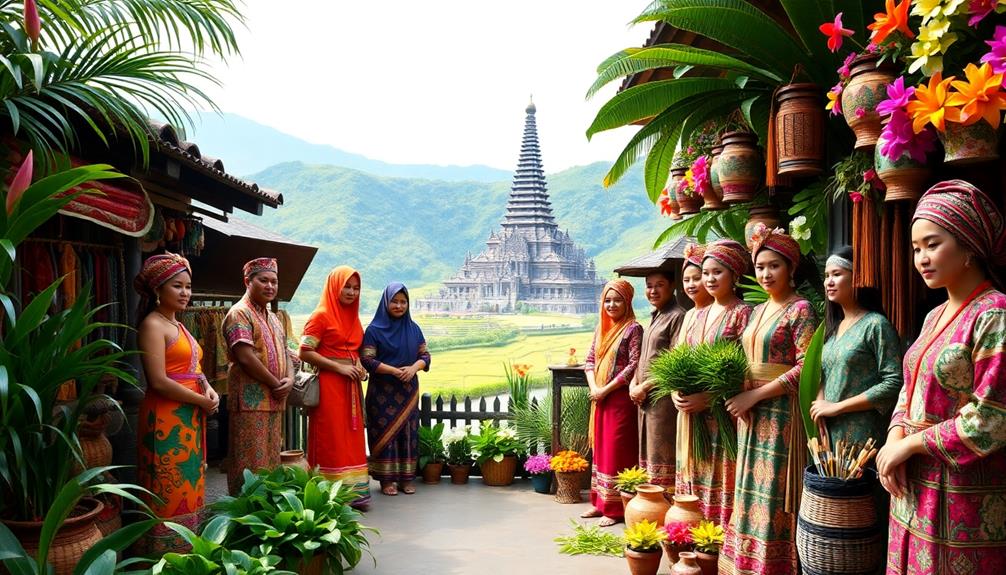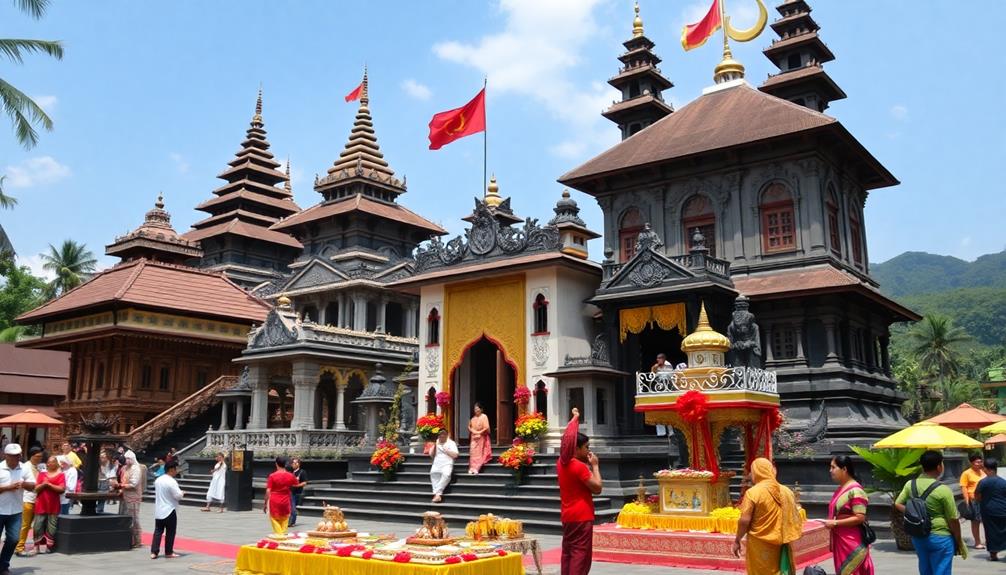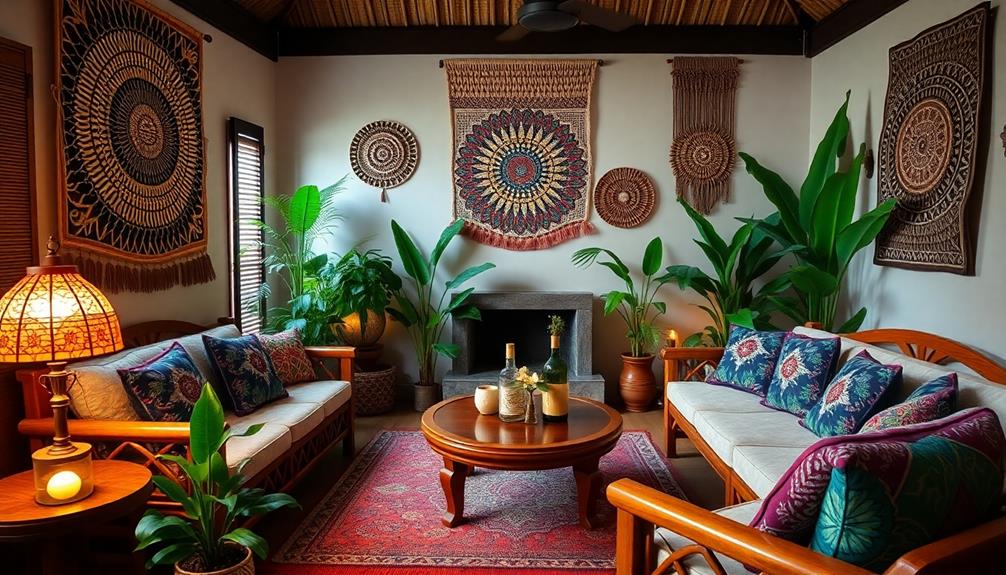When exploring Indonesian culture, get ready for a delightful experience! Indonesia is famous for its incredible diversity, with over 1,300 ethnic groups, each with its own unique traditions and customs. You’ll be amazed by the vibrant arts scene, which includes traditional dances and mesmerizing Gamelan music. Indonesian cuisine will tantalize your taste buds with its rich flavors, and strong family values create close-knit communities. The country’s blend of religious practices contributes to a fascinating spiritual tapestry. Every region has surprises that reflect local heritage and creativity. Stay a while, and you’ll discover even more captivating insights into Indonesian culture and design! If you’re a fan of architecture and design, you’ll be enchanted by the intricate detail and beauty of Indonesian interior design inspiration. The fusion of traditional craftsmanship and modern influences creates a unique aesthetic that mirrors the country’s rich history and artistic talent. From elaborate wood carvings to the use of colorful textiles, Indonesian interior design truly represents the culture’s creativity and skill.
Key Takeaways
- Indonesia boasts over 3,000 traditional dance forms, showcasing the country's rich cultural heritage and artistic diversity.
- The Gamelan ensemble, recognized by UNESCO, features unique instruments and plays a vital role in Indonesian traditional music.
- Handicrafts like decorative masks reflect the artistic expressions of Indonesia's over 1,300 distinct ethnic groups.
- Indonesian cuisine is renowned for its diverse flavors, influenced by regional ingredients and cultural practices, with rice and chili as staples.
- The national motto "Bhinneka Tunggal Ika" emphasizes Indonesia's unity in diversity, celebrating the coexistence of numerous cultures and ethnicities.
Cultural Diversity and Ethnic Groups

Indonesia's vibrant cultural tapestry is woven from over 1,300 distinct ethnic groups, with the Javanese making up a substantial 40% of the population. This rich cultural diversity is what makes Indonesian culture so fascinating.
You’ll discover that the country is home to major ethnic groups like Batak, Nias, Mentawai, Asmat, Dani, Sumba, and Dayak, each boasting unique customs and traditions. Additionally, Indonesian handicrafts, such as the intricately designed Indonesian decor masks, showcase the artistic expressions of these diverse cultures. If you’re looking to infuse your home with a touch of Indonesian culture, these Indonesian decor masks can serve as a centerpiece for stunning interior design ideas. From wall hangings to table decorations, these handicrafts can bring an exotic and colorful feel to any living space. Whether you’re drawn to the bold patterns of the Dayak people or the intricate carvings of the Batak, Indonesian handicrafts offer a wide range of options for incorporating different cultural traditions into your home decor. In addition to masks, you can explore an array of Indonesian home decor treasures, including beautifully woven textiles and hand-carved wooden statues that reflect the spirit of their respective cultures. These pieces not only add vibrancy to your living spaces but also tell stories of the rich heritage and craftsmanship of Indonesia. As you curate your collection, each item becomes a conversation starter, celebrating the diverse artistry that thrives across the archipelago.
As you explore Indonesia, you'll notice how cultural identity varies considerably across regions. Local festivals and traditional ceremonies often reflect a blend of indigenous practices and external influences from trade and colonization. This diversity isn't just a statistic; it's a living part of everyday life in Indonesia.
The national motto, "Bhinneka Tunggal Ika," meaning "Unity in Diversity," perfectly encapsulates Indonesia's commitment to recognizing and valuing its myriad cultures and ethnicities.
Even though the Javanese represent the majority of the population, the vibrant customs of other ethnic groups enrich the nation's cultural landscape. Each interaction you have will reveal the intricate layers of Indonesian culture, showcasing how its people celebrate their differences while embracing their shared identity.
Traditional Arts and Performing Arts

Amidst Indonesia's rich cultural diversity, traditional arts and performing arts stand out as vibrant expressions of local heritage. With over 3,000 traditional dance forms, such as the Saman from Aceh and the Reog from East Java, you'll find that each dance tells a unique story reflecting the nation's ethnic diversity.
The Gamelan ensemble, recognized by UNESCO, plays a central role in traditional music across Java and Bali, featuring enchanting instruments like metallophones and gongs. Additionally, the use of vibrant colors and intricate patterns in Indonesian decorative pillows enhances the artistic expression found in these performances.
In addition to dance and music, Wayang theatre offers a fascinating glimpse into Indonesian mythology through shadow puppetry (Wayang Kulit) and live performances (Wayang Wong). This form of storytelling is also UNESCO-recognized, underscoring its cultural importance.
Furthermore, Pencak Silat, a traditional martial art originating from Java and Sumatra, blends performance with music, enriching community identity and cultural expression.
You'll also discover regional musical styles, including the kroncong, which fuses Portuguese influences with local sounds, showcasing Indonesia's rich musical heritage. Together, these elements form the backbone of Indonesian society, celebrating a profound connection to tradition and artistry.
Culinary Heritage and Flavors

With a tapestry of flavors woven from its diverse regions, Indonesian cuisine captivates food lovers around the world. This vibrant culinary heritage showcases a rich diversity, where rice, chili, and fish serve as staple ingredients.
You'll find that regional cuisines boast distinct profiles; for instance, Javanese dishes often lean toward sweet flavors, while those from Padang and Manado are known for their bold spiciness. Additionally, Indonesian wedding decor ideas often highlight the importance of communal dining, just like the shared experience of enjoying traditional dishes in a festive setting.
Traditional dishes like rendang, a spicy beef dish simmered in coconut milk, and gulai kambing, a fiery mutton stew, beautifully reflect local agricultural practices and the available ingredients.
As you explore, don't miss the bustling street food culture that offers affordable delights such as pisang goreng (fried bananas) and sate (barbecue skewers). These street foods are best enjoyed in communal settings, where sharing enhances the experience.
Indonesian culinary heritage isn't just about flavors; it also reveals the country's historical trade influences, enriching its cooking techniques.
Embrace this dynamic cuisine, and you'll discover a world of tastes that tell stories of the land and its people.
Family Values and Social Structure

In a culture rich with culinary traditions, the importance of family values and social structure is equally significant in Indonesia. You'll find that multi-generational households are common, emphasizing strong familial bonds and interdependence among family members.
Additionally, traditional Indonesian houses, known as "Rumah Adat," often reflect these values by accommodating extended families and encouraging close-knit community living, promoting daily interactions that reinforce social ties and create a support system traditional housing designs.
The collective nature of Indonesian society means that individual actions reflect on the entire family, highlighting family pride and reputation. This interconnectedness fosters a deep sense of responsibility and care among family members.
Family gatherings are central to social life, serving as opportunities to maintain relationships and celebrate achievements together.
Language plays an essential role in showcasing the cultural importance of family, with terms like "Bu" (mother), "Pak" (father), "Mas" (older brother), and "Kak" (older sister) woven into daily conversations. This practice not only emphasizes respect but also strengthens familial bonds.
In Indonesia, the values surrounding family and social structure aren't just traditions; they're foundational to the way life is lived, creating a vibrant tapestry of connections that sustain communities.
Religious Practices and Beliefs

Religion plays a pivotal role in shaping Indonesia's identity, deeply influencing daily life and cultural practices. With around 85% of its population practicing Islam, mainly Sunni, you'll find that Islamic traditions prevail in the spiritual landscape. The country officially recognizes six religions, including Protestantism, Catholicism, Hinduism, Buddhism, and Confucianism, showcasing its remarkable cultural diversity.
This diversity is reflected in various architectural styles, such as the traditional Indonesian housing, which often incorporates spiritual elements and cultural symbolism.
In Bali, Hindu culture takes center stage, greatly impacting local customs, temple architecture, and vibrant rituals. You'll notice that daily rituals, such as the call to prayer (azan) five times a day, are integral to community life, especially in mainly Muslim areas. These daily practices reflect the deep-rooted traditions that guide Indonesian society.
Moreover, traditional beliefs often coexist with major religions, leading to unique practices like the Javanese Abangan belief, which fuses elements of Islam and Hinduism. This blend enriches Indonesia's cultural diversity, creating a tapestry of religious practices that vary across communities.
Frequently Asked Questions
What Is Unique About Indonesian Culture?
Indonesian culture's uniqueness lies in its incredible diversity. You'll find over 1,300 ethnic groups, vibrant traditions like Gamelan music, delicious spicy cuisine, and communal rituals that celebrate life, all showcasing a rich cultural heritage.
What Are Indonesians Known For?
You'll discover Indonesians are celebrated for their rich cultural diversity, vibrant arts, delicious cuisine, and intricate batik designs. Their unique traditions and practices reflect a harmonious blend of influences, making Indonesia truly enchanting to explore.
What Are Some Interesting Facts About Indonesia?
Imagine steering through a vibrant tapestry. In Indonesia, over 270 million people weave together more than 750 ethnic groups, thriving with diverse languages, religious practices, and rich arts, creating a colorful blend that fascinates every visitor.
What Are the Unique Traditions of Indonesia?
You'll discover Indonesia's unique traditions through its diverse rituals, like the Toraja's elaborate death ceremonies, vibrant Balinese festivals, and communal living practices among the Dayak tribes, all showcasing the rich cultural tapestry of this fascinating country.
Conclusion
In exploring Indonesia's rich culture and design, you'll discover a vibrant tapestry woven from diverse ethnic backgrounds, traditional arts, and mouthwatering cuisine. For instance, imagine attending a Balinese dance performance, where intricate movements tell ancient stories, all while savoring a plate of Nasi Goreng. This experience encapsulates the warmth of family values and deep-rooted religious beliefs that bind Indonesians together. Embracing these elements, you'll gain a profound appreciation for this unique and colorful nation.









